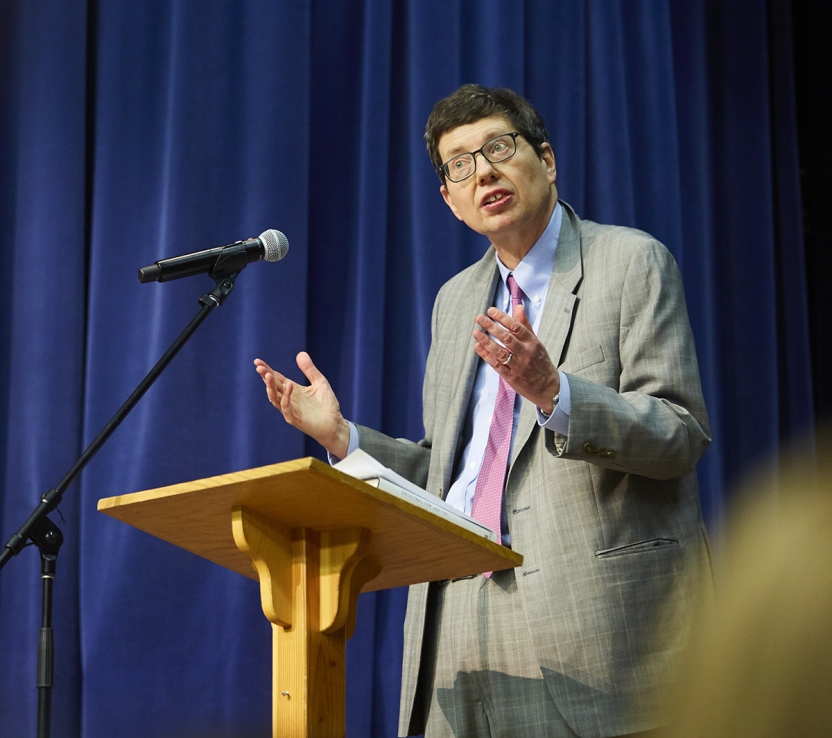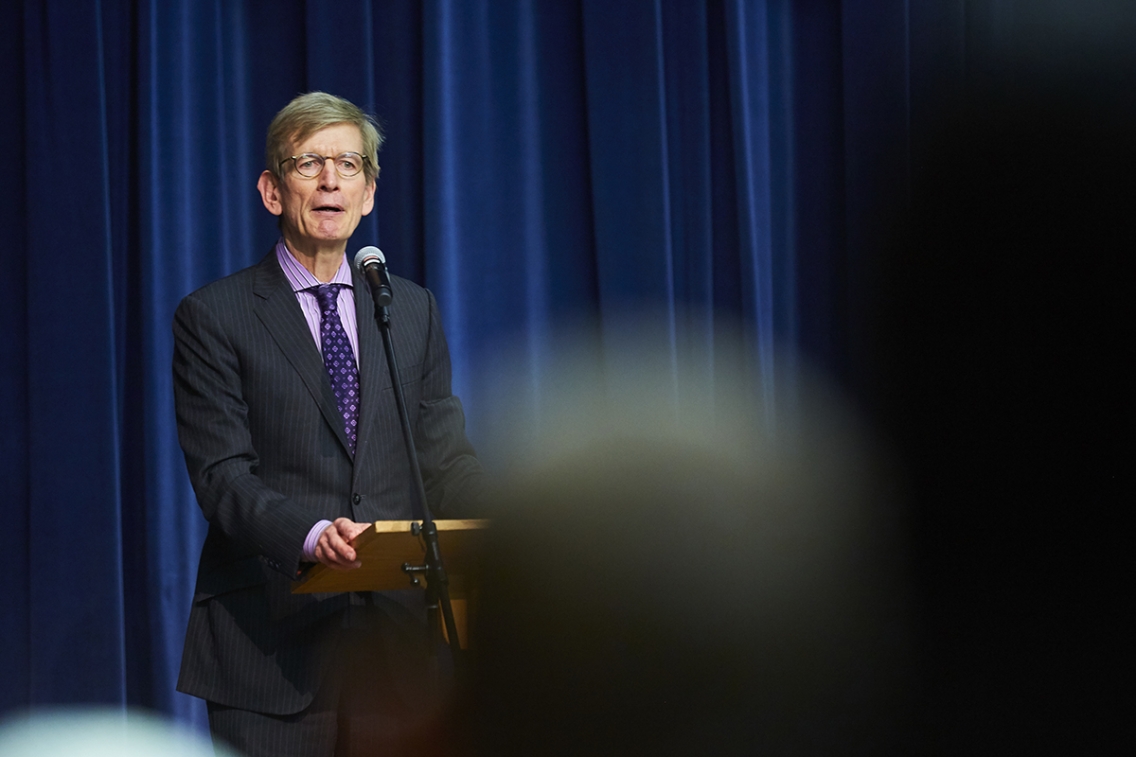Law Professors Debate ‘Courts in the Age of Trump’

MIDDLEBURY, Vt. – Two distinguished legal scholars debated each other in a lecture titled “The Courts in the Age of Trump” with a focus on the recent confirmation of Justice Brett Kavanaugh in a well-attended campus event held on October 25.
More than 250 members of the College community, mostly Middlebury undergraduates, filled Dana Auditorium to hear John O. McGinnis, a professor of constitutional law at Northwestern University, and James E. Fleming, a professor of law at Boston University, talk about President Donald Trump’s two appointments to the Supreme Court and whether they “pose a threat to fundamental rights and equality under the law.”
The panelists offered divergent views about the 2018 Supreme Court. McGinnis, who served in the administration of President George H. W. Bush as a deputy assistant attorney general and is a member of the Federalist Society, said he “generally applauds” Trump’s appointments of Kavanaugh and Neil Gorsuch because “they move the Court toward interpreting the Constitution according to its original meaning of its provisions.”
Fleming, a former litigation attorney who has published six books on constitutional law, urged the audience “to never forget Bush v. Gore, never forget the stolen seat [now occupied by Gorsuch], and never forget [Senator Mitch] McConnell’s plowing through of the Kavanaugh nomination. Never get over these wounds to the legitimacy of the Supreme Court and the legitimacy of our practice of constitutional law.”

The panelists, who know each other well, delivered prepared remarks concerning constitutional theories about originalism, federalism, textualism, majoritarianism, and substantive due process. The 90-minute event was moderated by Assistant Professor Keegan Callanan, a political scientist and director of the Alexander Hamilton Forum.
McGinnis, who went first in the debate, spoke in historical and theoretical terms about constitutional law before getting into the current administration in Washington: “If you, like me, have some reservations about Donald Trump’s moral values, then you should actually be grateful that he is not nominating judges who want to read his moral values or their moral values into the Constitution. [You should be] grateful for judges who want to follow the original meaning of the Constitution. You should be grateful for the rise of originalism.
“Indeed, without originalism, one could easily imagine a right-wing activist court saying that fetuses were persons deserving of constitutional protection, i.e., prohibiting the laws that permit abortion … or that state minimum-wage laws were unconstitutional.”
He continued, “If you have an angry reaction to [Supreme Court] decisions, then I ask that you consider how your fellow Americans would feel if judges read moral principles that you liked, but were not clearly part of the Constitution, and went ahead and made Constitutional law on that basis. This practice would undermine the court, making it less effective at protecting the consensus principles that are actually in the Constitution—very important consensus principles [such as] trial by jury and freedom of speech.”
McGinnis, who was a law clerk in the 1980s to then-Court of Appeals Judge Kenneth W. Starr, concluded with an argument in favor of states’ rights and the Constitutional amendment process.
“The original Constitution as amended gives you great scope to make it better,” he said. “Our states are, as Justice Brandeis said long ago, laboratories of democracy. There are very few restrictions on what states can do to advance new moral visions for additional rights for people, for transgender people, or to place new restrictions on markets or to empower markets. These ideas then can become demonstration projects for the rest of the nation, and they can catch fire.
“It’s always open to you as well to become part of the great historical movements to amend our Constitution through Article 5 by persuading your fellow citizens, as did generations before you, when they correctly provided equality to African Americans, the vote to women, and authorized a progressive income tax.
“The rule of law is the province of judges, and it’s an important province, but you, not Supreme Court judges, are the only legitimate framers of our moral and political future.”
Professor Fleming discussed what the replacement of Justice Anthony Kennedy with Brett Kavanaugh might mean in the future before offering “a constructive pep talk to liberals and some words of caution for conservatives.”
Kavanaugh “is an anti-regulatory conservative mainly concerned with attacking the underlying administrative state,” Fleming said, referring to a recent New York Times opinion piece by reporter Emily Bazelon and law professor Eric Posner. But “being a textualist hardly makes one an originalist,” he said, and “Kavanaugh is no more originalist than [Chief Justice John] Roberts or [Justice Samuel] Alito.”
Is Kavanaugh likely to overrule the “substantive due process cases” that make up Kennedy’s legacy? Fleming asked. “Based on what Kavanaugh has said … we can expect him to side with the dissenters in Obergefell” v. Hodges, for example, which was the landmark 2015 case that guaranteed same-sex couples the right to marry.
Fleming opined, “It’s good that [Middlebury] did not schedule this event for two weeks ago right after the Senate Republicans and one Democrat shamelessly confirmed a perjuring sexual assaulter with an outrageously partisan, aggrieved, conspiratorial, injudicious temperament to the Supreme Court. I would have been too ashamed, dismayed, and shocked to say anything constructive about Trump, Constitutional interpretation, and the future of the Supreme Court two weeks ago.”
Americans have to acknowledge the fact “we are stuck with a packed Supreme Court consisting in part of a sexually harassing perjurer, Clarence Thomas; an occupant of a stolen seat, Neil Gorsuch; and a sexually assaulting perjurer with a Trumpian temperament, Brett Kavanaugh. Like it or not, this is the Supreme Court of the United States, and we have to move on.”
Fleming advised to liberals to “stop harboring hollow hopes about the Supreme Court” and pursue justice through state courts and state legislatures. And to conservative thinkers he said, “Beware that such a [Supreme Court] may come to live in infamy” and that Justice Roberts could become the “swing vote” who can “moderate the hard right.”
The debate was sponsored by the Alexander Hamilton Forum, a new faculty-led initiative at Middlebury that “aims to foster thoughtful engagement with the ideas that have informed the creation and development of the American polity.”
By Robert Keren; Photos by Yeager Anderson ’13.5

